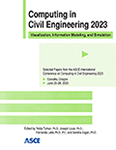Transfer Learning-Based Question Generation for Building a Construction Safety Chatbot
Publication: Computing in Civil Engineering 2023
ABSTRACT
Fall hazard is one of the leading causes of fatalities in the construction industry. To alleviate fall risks, the US Occupational Safety and Health Administration (OSHA) agency developed safety regulations for construction project team members. However, retrieving relevant information on fall protection from OSHA’s text-heavy standards is a challenge for personnel with limited safety knowledge and experience. With the rise of Industry 4.0, chatbots have become increasingly popular, offering a solution to the information overload in the architecture, engineering, construction, and operations (AECO) industry. This research aims to develop a dataset for building and validating intelligent construction safety chatbots (CSCs) to improve the efficiency of information retrieval from safety regulations (i.e., OSHA) using fall protection as an example. This research uses two state-of-the-art language models, Text-To-Text Transfer Transformer (T5) and Generative Pre-trained Transformer 3 (GPT-3), to generate natural language questions from US OSHA textual regulations about fall protection. The performance of the two models in question generation is compared and evaluated. The evaluation shows that T5 generates questions that are more relevant and diverse in structure and question type in comparison to GPT-3. Based on the evaluation results, the T5-generated questions are used to build a CSC dataset. The developed dataset can be used to train and evaluate a CSC, and the developed method can be extended to other fields, such as building codes and contracts. The contribution of this research is that it facilitates the adoption of transfer learning and chatbot technologies in the AECO industry.
Get full access to this article
View all available purchase options and get full access to this chapter.
REFERENCES
Adamson, G. 2023. “Explaining technology we don’t understand.” IEEE Transactions on Technology and Society, 1–1. https://doi.org/10.1109/TTS.2023.3240107.
Brown, T. B., et al. 2020. Language Models are Few-Shot Learners.
Eiris, R., K. Dover, and M. Gheisari. 2021. “Online VR Training with Virtual Humans and Omnidirectional Images for Fall Hazard Recognition.” Computing in Civil Engineering 2021, R. R. A. Issa, ed., 1261–1268. Orlando, FL: American Society of Civil Engineers (ASCE).
Elghaish, F., J. K. Chauhan, S. Matarneh, F. Pour Rahimian, and M. R. Hosseini. 2022. “Artificial intelligence-based voice assistant for BIM data management.” Autom Constr, 140: 104320. https://doi.org/10.1016/J.AUTCON.2022.104320.
Gheisari, M., A. Rashidi, and B. Esmaeili. 2018. “Using unmanned aerial systems for automated fall hazard monitoring.” Construction Research Congress 2018: Safety and Disaster Management - Selected Papers from the Construction Research Congress 2018, 62–72. New Orleans, Louisiana: American Society of Civil Engineers (ASCE).
Huang, X., and J. Hinze. 2006. “Owner’s Role in Construction Safety.” J Constr Eng Manag, 132 (2): 164–173. American Society of Civil Engineers (ASCE). https://doi.org/10.1061/(ASCE)0733-9364(2006)132:2(164).
Kumar, A., A. Kharadi, D. Singh, and M. Kumari. 2021. “Automatic question-answer pair generation using Deep Learning.” Proceedings of the 3rd International Conference on Inventive Research in Computing Applications, ICIRCA 2021, 794–799. Institute of Electrical and Electronics Engineers Inc. https://doi.org/10.1109/ICIRCA51532.2021.9544654.
Lee, H., G. Lee, S. Park, S. Lee, J. V. Jacobs, and C. R. Ahn. 2023. “Collective Sensing of Workers’ Loss of Body Balance for Slip, Trip, and Fall Hazard Identification: Field Validation Study.” Journal of Computing in Civil Engineering, 37 (1). American Society of Civil Engineers (ASCE). https://doi.org/10.1061/JCCEE5.CPENG-4938.
Malhar, A., P. Sawant, Y. Chhadva, and S. Kurhade. 2022. “Deep learning based Answering Questions using T5 and Structured Question Generation System’.” Proceedings - 2022 6th International Conference on Intelligent Computing and Control Systems, ICICCS 2022, 1544–1549. Institute of Electrical and Electronics Engineers Inc. https://doi.org/10.1109/ICICCS53718.2022.9788264.
McTear, M. 2020. “Conversational AI: Dialogue Systems, Conversational Agents, and Chatbots.” Synthesis Lectures on Human Language Technologies, 13 (3): 1–251. San Rafael, California: Morgan & Claypool. https://doi.org/10.2200/s01060ed1v01y202010hlt048.
Ojha, A., Y. Liu, S. Shayesteh, H. Jebelli, and W. E. Sitzabee. 2023. “Affordable Multiagent Robotic System for Same-Level Fall Hazard Detection in Indoor Construction Environments.” Journal of Computing in Civil Engineering, 37 (1). American Society of Civil Engineers (ASCE). https://doi.org/10.1061/(ASCE)CP.1943-5487.0001052.
Ou, Y.-Y., S.-W. Chuang, W.-C. Wang, and J.-F. Wang. 2022. “Automatic Multimedia-based Question-Answer Pairs Generation in Computer Assisted Healthy Education System; Automatic Multimedia-based Question-Answer Pairs Generation in Computer Assisted Healthy Education System.” 2022 10th International Conference on Orange Technology (ICOT). https://doi.org/10.1109/ICOT56925.2022.10008119.
Raffel, C., N. Shazeer, A. Roberts, K. Lee, S. Narang, M. Matena, Y. Zhou, W. Li, and P. J. Liu. 2020. “Exploring the limits of transfer learning with a unified text-to-text transformer.” Journal of Machine Learning Research, 21: 1–67.
Rajpurkar, P., R. Jia, and P. Liang. 2018. “Know What You Don’t Know: Unanswerable Questions for SQuAD.” Proceedings of the 56th Annual Meeting of the Association for Computational Linguistics, 784–789.
Roose, K. 2022. “The Brilliance and Weirdness of ChatGPT.”, December 5, 2022.
Sun, R., X. Zhou, and F. Fang. 2021. “Neural Question Generation Using Question Type Guidance.” Proceedings - 2021 17th International Conference on Computational Intelligence and Security, CIS 2021, 328–332. Institute of Electrical and Electronics Engineers Inc. https://doi.org/10.1109/CIS54983.2021.00075.
Wang, H. H., and F. Boukamp. 2009. “Ontology-based job hazard analysis support.” Proceedings of the 2009 ASCE International Workshop on Computing in Civil Engineering, 346: 676–685. https://doi.org/10.1061/41052(346)67.
Information & Authors
Information
Published In
History
Published online: Jan 25, 2024
ASCE Technical Topics:
- Architectural engineering
- Building codes
- Buildings
- Business management
- Construction engineering
- Construction management
- Health hazards
- Laws and regulations
- Legal affairs
- Occupational safety
- Practice and Profession
- Public administration
- Public health and safety
- Safety
- Smart buildings
- Standards and codes
- Structural engineering
- Structures (by type)
Authors
Metrics & Citations
Metrics
Citations
Download citation
If you have the appropriate software installed, you can download article citation data to the citation manager of your choice. Simply select your manager software from the list below and click Download.
